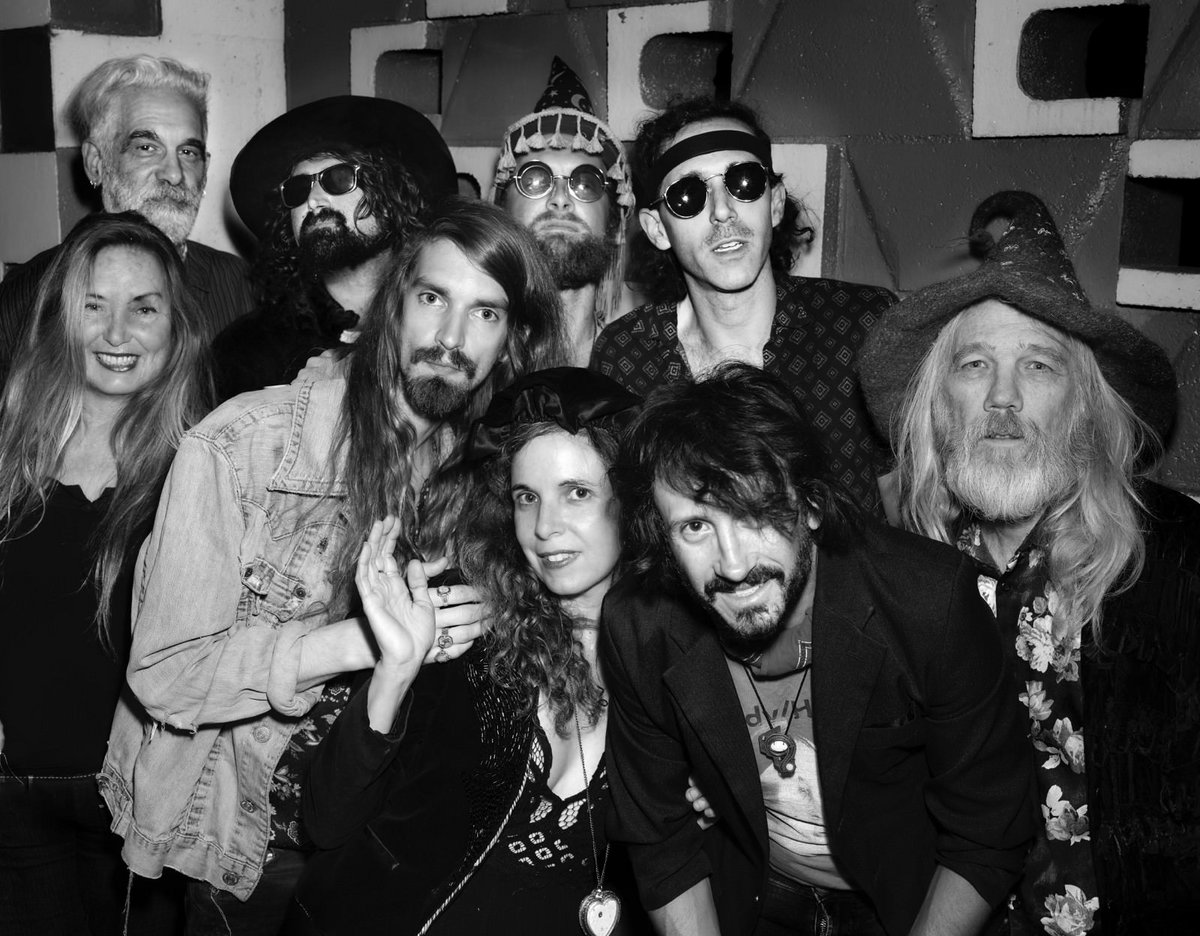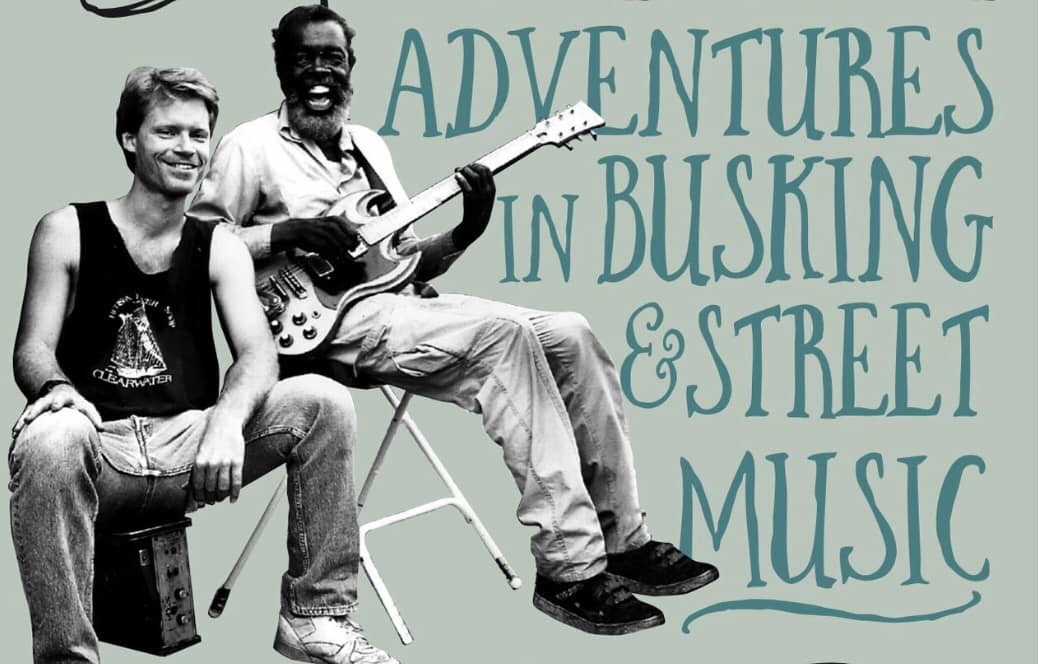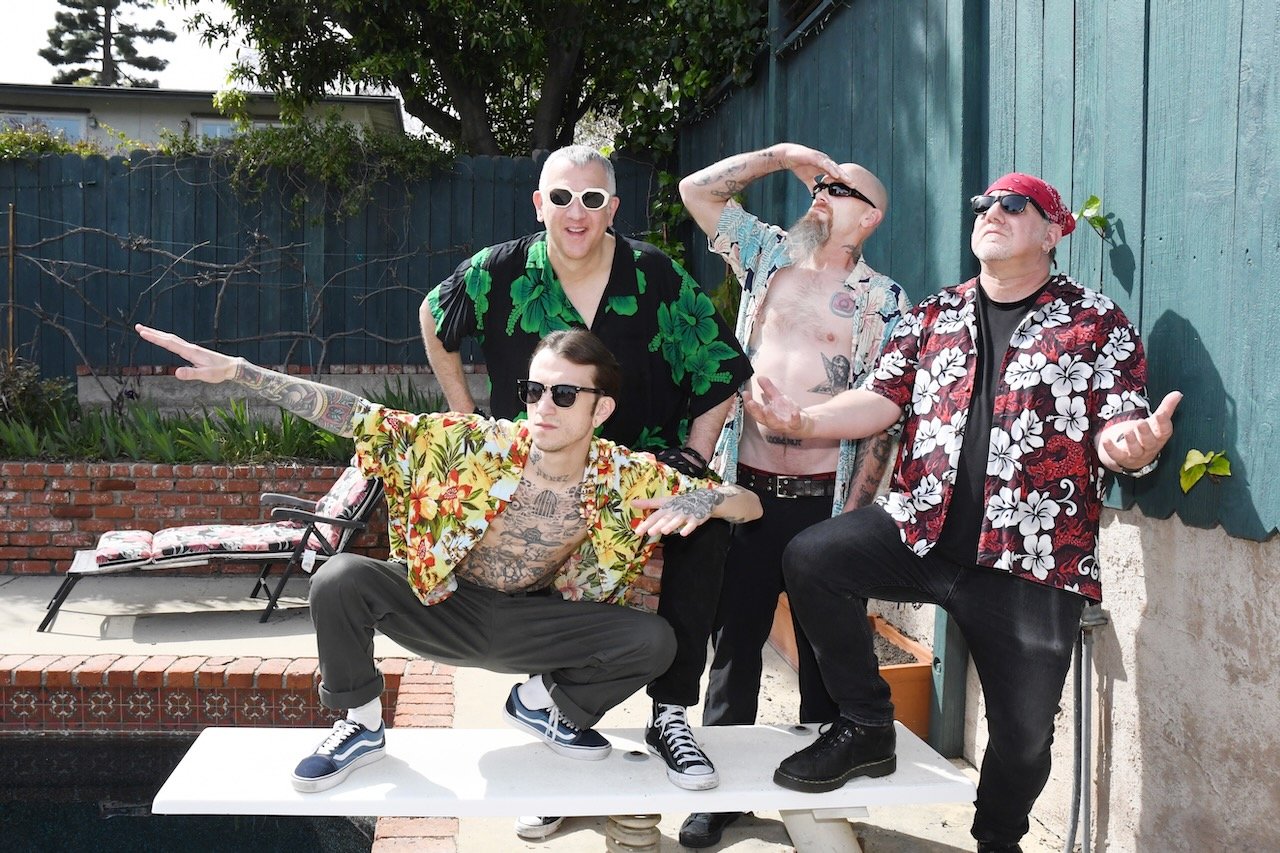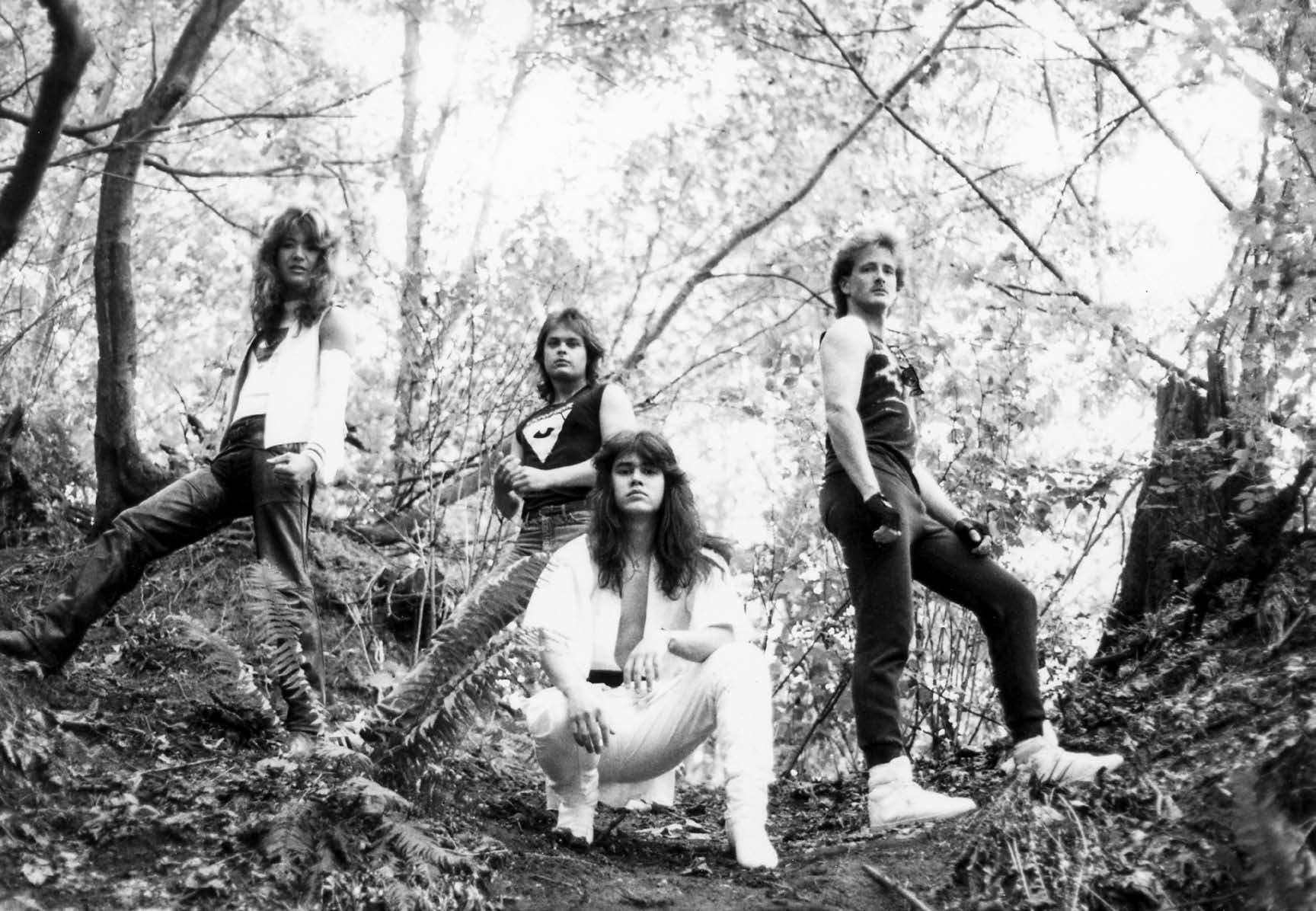Elf Freedom | Interview | Transcendent Frequencies
Under a vast, shimmering sky where reality blurs with the whispers of dreams, Elf Freedom beckons you to a journey beyond the familiar.
Their latest creation, ‘Visions Of Utopia,’ will be unleashed on March 15th—a portal inviting us to abandon the well-worn paths of conventional sound. Imagine a realm where each echo, unfolds like a secret story whispered by the wind… This music is a living tapestry woven from passion, serendipity, and the wild, untamed heartbeat of existence. In these sonic corridors, the mundane dissolves into a cascade of colors and sensations, where every note serves as a stepping stone into an inner sanctum of wonder. The spirit of improvisation and emotion spills over each measure, inviting listeners to relinquish control and surrender to the flow of sound.
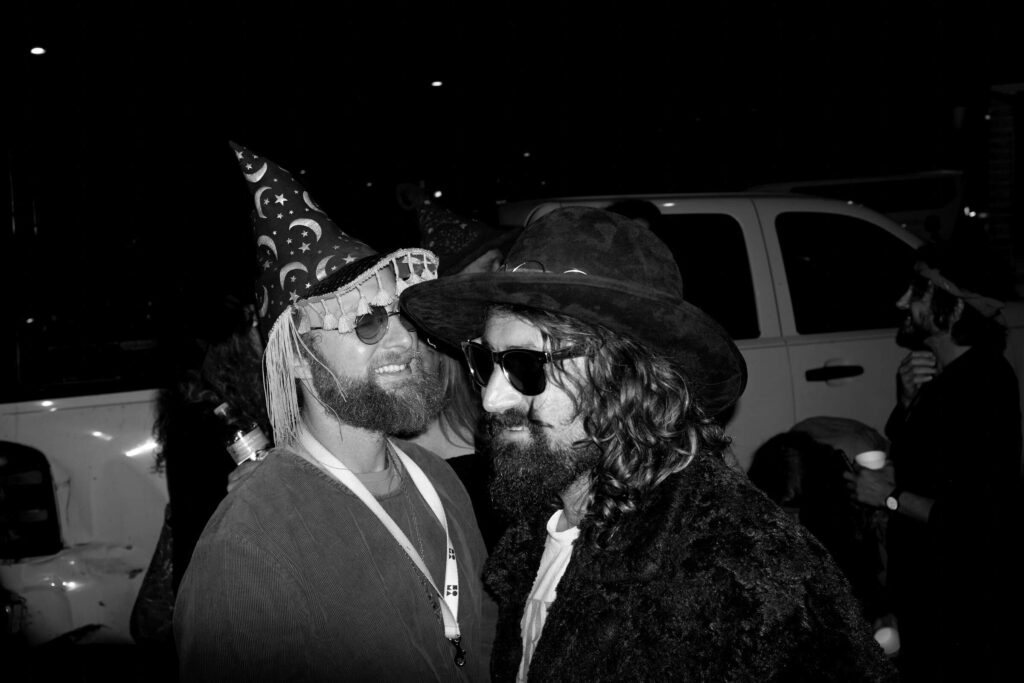
“Transformation is part of the journey”
Let’s start by talking about ‘Solstice,’ this album feels like an invitation to explore new dimensions of sound. How did the concept of this album come together for Elf Freedom, and what were you hoping to communicate through it?
Nora: ‘Solstice’ came together literally on the Summer Solstice of 2023. That’s when the base tracks were improvised for the piece. We are interested in exploring and experimenting with sound, the psychological effects that music has on the listener, creating sonic tones that captivate and expand consciousness, relieve stress, communicate directly to the heart, and lift people out of this reality during the duration of the concert.
We call ourselves Elf Freedom because this name describes a state we feel when our consciousness is freed by the immersive quality of the music. The elf is an archetype for a person who lives in harmony with nature, connected to source energy, and present in the moment. The quality of time that music can shift has always fascinated us, how a piece can sometimes make an hour seem like 20 minutes or 10 minutes seem like a lifetime download of information.
I once went to a Magma concert that was two hours long and had this effect. I didn’t realize two hours had passed, I was so absorbed by the concert.
Bee: Transformation is part of the journey, and when there’s nowhere left for culture to expand, it begins expanding into other dimensions. That’s where you find Elf Freedom, waiting in the lobby, greeting your arrival. Thanks for paying us a visit, and remember to buy something on your way out. That’s what we were hoping to communicate on ‘Solstice.’
The album’s title, ‘Solstice,’ conjures images of transitions and turning points. Does the music reflect a specific change or shift in your life or in the band’s evolution?
Nora: The answer is yes, it’s a pivotal album for us. This album is our first official release apart from our live concert recordings. It demonstrates our evolution, as we’ve become more comfortable playing with each other, knowing each other’s expressions in a deeper way, and allowing us to improvise with better fluidity.
Bee: As the universe is expanding, so is our band. As our band is expanding, so is the universe.
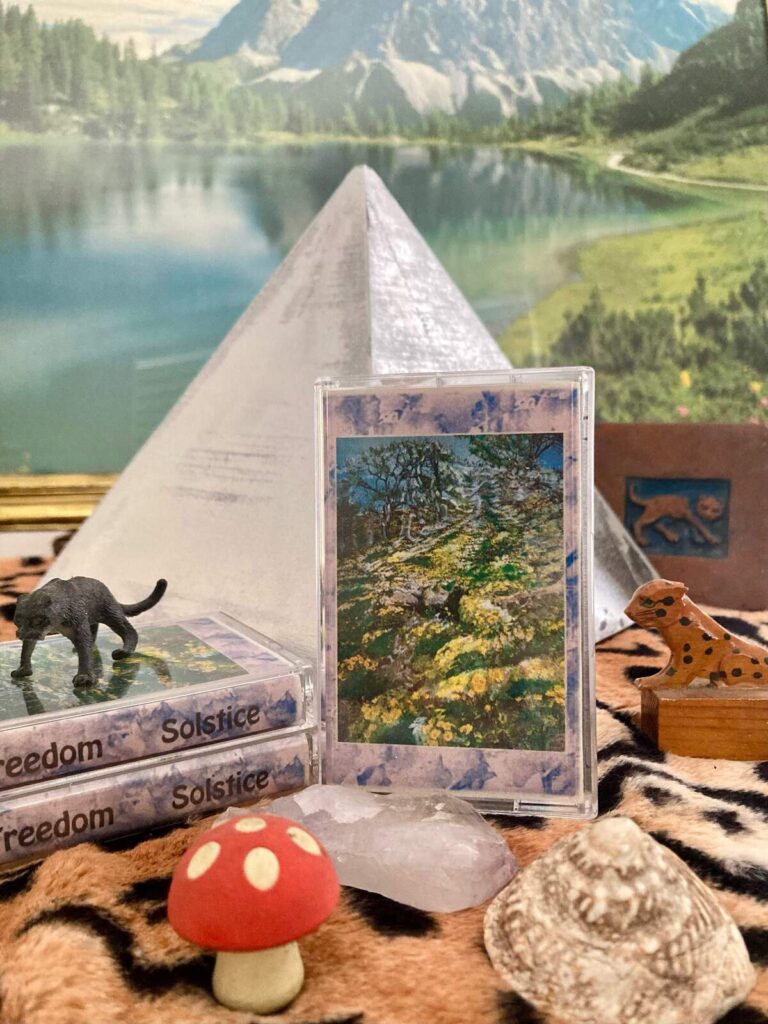
You’ve described the music of Elf Freedom as “a conduit for sound healing.” Could you dive deeper into that idea? How do you see your music as a tool for healing, and how does that influence your writing and performing process?
Nora: Music has the ability to shift a person’s emotional state. Sad songs or uplifting ballads can influence a person’s mood. What we want people to experience with our music is the sense that there is another reality they can access through being present in the moment with us, where time and space feel different and sound becomes a portal to break through, transform, and activate the imagination.
So much of our consciousness in day-to-day life in the West is taken up with worries about the future and ruminations about the past. Because we improvise, the creation and writing of our music happen in real time. Our audience is invited into our creative process as we journey through a piece.
After we play, audience members often tell me the performance was inspiring to them creatively. I’ve been told this so many times that I believe it’s a legitimate side effect.
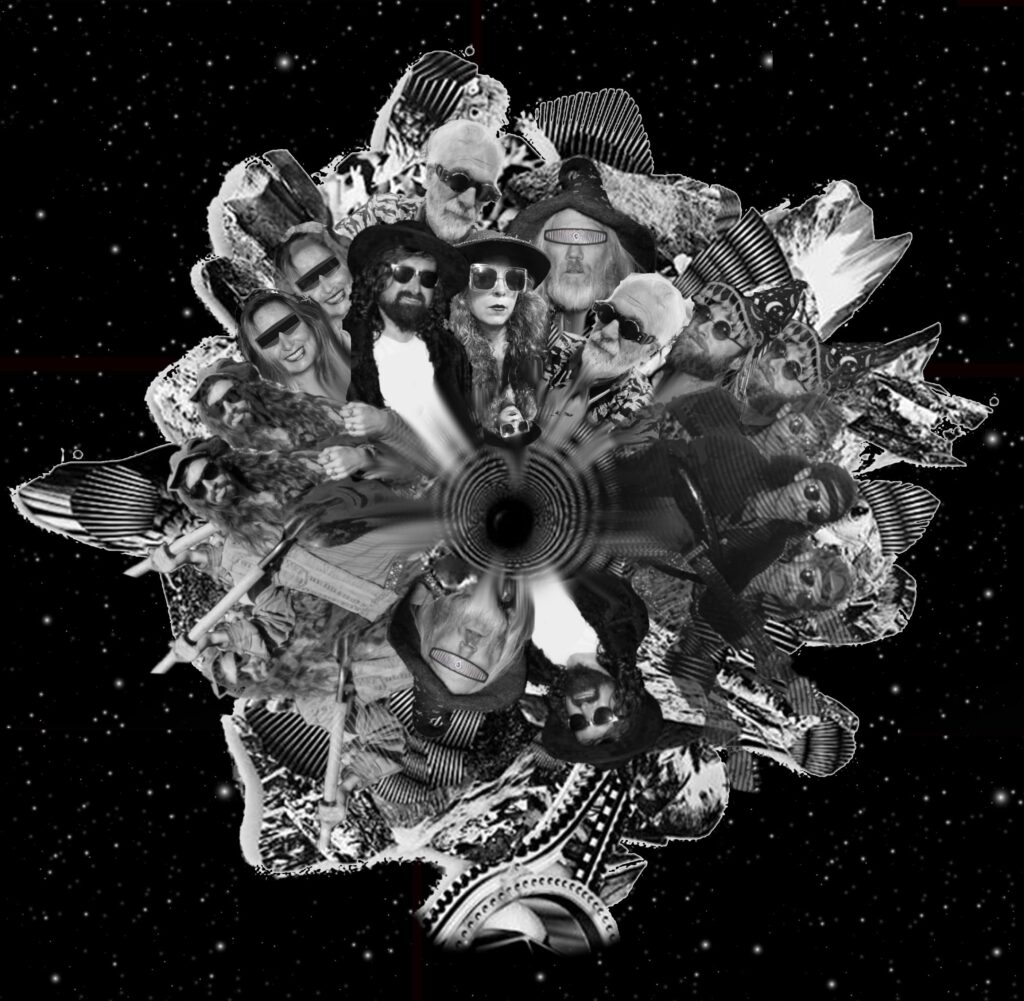
The track ‘Invisible Communication’ stands out as a hypnotic journey where voice and instrument seem to merge. Can you share more about the creative process behind that song and how you and Nora created that beautiful symbiosis between the vocals and guitar?
Mirage: Nothing played on ‘Solstice’ was prepared by us as a group. In fact, all of Elf Freedom’s music is improvised. ‘Solstice’ is an album made up of jams from the first half of our meeting on the night of the Summer Solstice in 2023. The flowers from that evening were plucked, trimmed, and carefully arranged.
There was an overdub session where we all played over the entire session with different instruments. I culled a lot of the synth sounds from that and made loops to help with the track transitions. ‘Invisible Communication’ stemmed from a riff I recorded over 10 years ago that never felt like it reached its potential.
I had only been an Elf for a few months when the Solstice hit, and up until that point, I felt it was only appropriate to play something made up on the spot. But I began finding a home for many of my stray pets in the Elf church. A single strum of a guitar and an entire riff are no different. What matters is playing them in line with the zeitgeist.
I played the riff that particular evening, and we all clicked with it. I try to listen to what Nora is doing, as we often share the same sonic atmosphere. If I feel the energy building, I will try to support that by pushing harder as well, or I will try to be a rock so things stay solid.
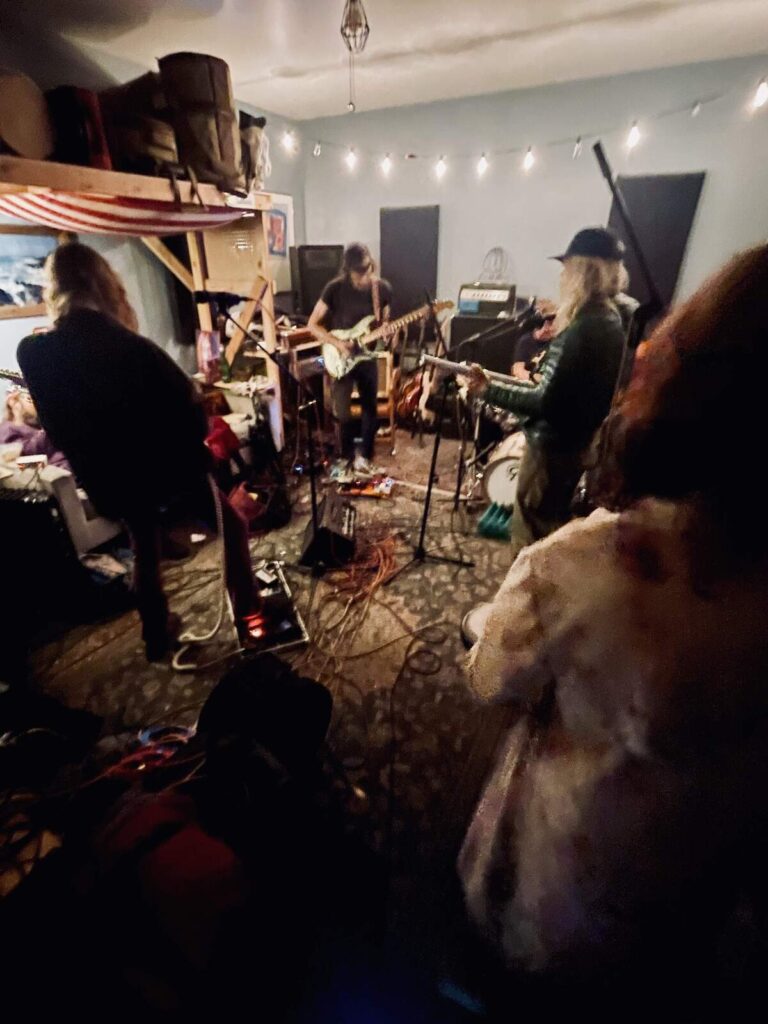
Speaking of collaboration, Elf Freedom is made up of a diverse group of sonic explorers. How do the different personalities and skills of each band member shape the sound of the music?
Mirage: On its surface, I see that music is made up of the same states of matter that exist in the physical realm. More specifically, there are the sounds of the earth and the sounds of the sky.
The earth is made up of solid ground covered in rocks, buildings, and rivers, just as rhythm and riff create form and structure. Above that is the sky, forever shifting and loose, clouds always changing form, looking one way one minute and completely different another. In the musical sky exists ambience and freeness. These two planes count on each other to create harmony. The sky is meaningless without the earth contextualizing it below. The earth is sterile without the sky above.
As a group, we all play our part in the landscape. Speaking about the players on ‘Solstice,’ Jacky is one of the rocks, Paul a sheet of cirrus clouds, Nora the sun or moon. Bee and I take two forms: when cool, we are rivers cutting through the landscape, but as things heat up, we evaporate into the sky. Our metamorphosis creates wind that can shape clouds and even topple mountains.
Once a piece begins and we feel the click, it is important for all of us to hold on to the energy until it has reached its zenith. Then, let it down gently and safely. The ending is about honoring its life and experiencing its death. The respect we give to our music is how all of society should treat each other—witness them both. Hold them carefully so they may stand up and reach as far as possible. Once they can reach no more, we gently lower them to the ground.
As life leaves them, their traces and the life they lived influence another to be held carefully and to reach as far as possible. That is, in an ideal world, which it certainly isn’t. The flaws in the music reflect that. Some things are not treated with care, and turmoil below prevents their zenith. To keep a whole heart, one must find the beauty in that tragedy.
It is through editing that flaws can be turned into crowns of the music. No painting is ugly if it is framed in just the right place. Given the spontaneous and inimitable nature of our music, Bee’s dedication to recording every one of our meetings is what allows any of these jams to grow into something like ‘Solstice.’
Bee: Our personalities are merely here to express that we are not robots, and we do not do this for robopleasure.
You’ve performed in various cities and countries, from Los Angeles to Europe. How does the energy of different audiences influence your performance?
Nora: Because we improvise, the energy of different audiences does affect the performance. When I toured with my past projects, The Centimeters and Fancy Space People, we had set lists of songs. I didn’t really notice the effects dramatically on my performances in different cities until Elf Freedom. When Bee and I toured Europe as a duo in 2018 and 2019, I really noticed an energetic difference between shows when we flew directly from a Swedish tour to Prague in the Czech Republic. I love Sweden. We recorded an album there that we have not released yet called ‘Visions of Utopia.’ It’s a beautiful place, and the people are generally very warm. I always feel taken care of and respected as a musician there. It’s one of the countries we’ve successfully maintained and developed good friendships with people we met on tour. But I think for us, performance-wise, energetically, some audience members in Sweden may have a philosophical influence called The Law of Jante (Janteloven), which is a code of conduct that denotes a social attitude of disapproval towards expressions of individuality and personal success. Since our music is pretty far out there, I felt at times a strange conservative nature in the room that affected the way I connected and expressed myself. We still had very lovely shows, especially at Larry’s Corner in Stockholm. A couple of people in Sweden mentioned the Law of Jante after we played, I think because our music triggered them to think of it. I had never heard Jante mentioned to me before I performed as Elf Freedom. After our Swedish tour, we went directly to Prague, and the conservative energy I felt in Sweden was gone. I felt when we performed in Prague, I had this feeling of a vast space of possibility. It’s hard to describe other than my personal creative channels felt infinitely free to express themselves. We saw so much amazing art hanging on the walls of bars and cafes by local artists. I took a couple of taxi cabs and was impressed by the cab driver’s taste in music. I think Prague is a place that celebrates creativity and personal expression in the arts. It really stands out compared to other cities I’ve visited in Europe. Being that we are from the U.S., I felt a little suspicion and hesitancy to connect with locals sometimes, not always; we did have some very lovely hosts, but I did notice it when we would be at shows or out in public. From my experience, it’s not as personally warm as Sweden, but creatively, a conduit for artistic expression is amply available. It literally felt like electricity in the air.
Bee: Being that my mother’s mother was Czech and spoke Czech as her first language, it always feels like a spiritual journey to visit and perform in the Czech Republic. The nature, architecture, people, food, music, art, philosophy, and culture are all amazing. Also, true story: in 2018, Nora and I hitchhiked to perform a show in a castle in the Czech Republic because we missed the bus. This might be the only concert I can remember where the audience insisted we do three encores.
“We are collaborating with each other in the moment”
There’s a deep psychological element to the music, especially in how it draws listeners into immersive, transcendent spaces. How intentional is that? Do you ever think about the psychological or emotional journey your music takes people on, or do you let the music lead and let the listeners interpret it for themselves?
Nora: We do recognize our music has this effect of drawing the listener on a journey. We may begin by talking about what emotions or energy we want the piece to possess, especially if it’s for a live score. But ultimately, because we are improvising, there is an element of surrender. We are collaborating with each other in the moment, locking into a mysterious psychic space, a divination, so to speak, like pulling tarot cards.
Mirage: The only intention I have when playing music is to express my feelings. The only people I think about when making music are the people I’m making it with or maybe a muse or two, and how they will feel when I show them what I have been working on. I don’t have a specific thought about what kind of journey someone will go on with the music. I put things together in a way that I would want to hear them. Once working on mixing and editing something, I will uncover something and it will tell me where to take it next. Sometimes I don’t think it’s my choice or taste. I’m just doing what the music is telling me to do.
Bee: The deep psychological element comes from the subliminal messages we sneak into our songs.
Your work combines so many different sounds and techniques, from the hypnotic rhythms and ethereal vocals to the experimental instrumentation. Is there a “rule” or guiding principle you always follow when composing or recording?
Nora: I think the main guiding rule is to listen deeply and be present with each other so that our expressions intertwine and are complementary forces that create something beyond ourselves.
Mirage: We all have our sensibilities. I don’t think we’ve ever really had a discussion about style or how we want things to sound. I love music that feels like it’s being heard in the distance. I have a deep love for music from around the world during the “psychedelic” era of the late 60s and 70s. Music being sung in a language I can’t understand is such a powerful thing to me. It turns the voice into an abstraction and places it on the same level as other instruments. Words can overly define things. Now, without words, the voice sings a much more profound song. I think Nora’s singing gives a similar feeling to that, a song that I can almost hear. And although I don’t know specifically what she is singing, her song reflects what I am feeling.
Bee: Our recording process is to improvise everything and then record a wild number of improvised overdubs over the top of that using a 16-channel digital interface and endless layers. That’s why the music sounds so crazy. Not many recording artists take this approach.
‘Solstice’ blends a wide array of sounds, yet there’s an unmistakable thread of soul running through it. How do you balance the experimental and the soulful?
Mirage: I have a scale that I keep in my truck that balances soulfulness and experimentation. I take every session after we finish and place it on there. If it doesn’t sit right in the middle, we throw it out.
Bee:
Answering Haiku
Turns out Rocco’s scale, you see
Also works for weed
Nora, you’re known as a sound healer, and your voice carries a therapeutic quality that seems to guide listeners on a transformative journey. Could you share more about how your healing background informs your singing style and how your voice becomes an integral part of the immersive experience Elf Freedom creates?
Nora: I’ve worked as a sound healer since 2011. I started this practice as a means to heal myself after my father passed. His death was complicated, and I was left very traumatized. I was so emotionally impacted that I could not feel comfortable in my mind or body. The emotional turmoil was debilitating. My heart and stomach ached with grief. My muscles hurt, and I would wake up in anguish, crying uncontrollably. I noticed that when I would sing with a drone, I could direct my voice in a way that would radically shift these debilitating emotions. At the time, I was reading a lot of energy healing books and began experimenting with the sound of my voice directed at my different chakra points. I would sing to my heart if it hurt. I imagined I was playing my heartstrings, so to speak, until the tension relaxed. After I perform a sound healing on myself, I notice that it not only relaxes me, but I also feel inspired. Sometimes ideas come to me for problems I am trying to solve in my life.
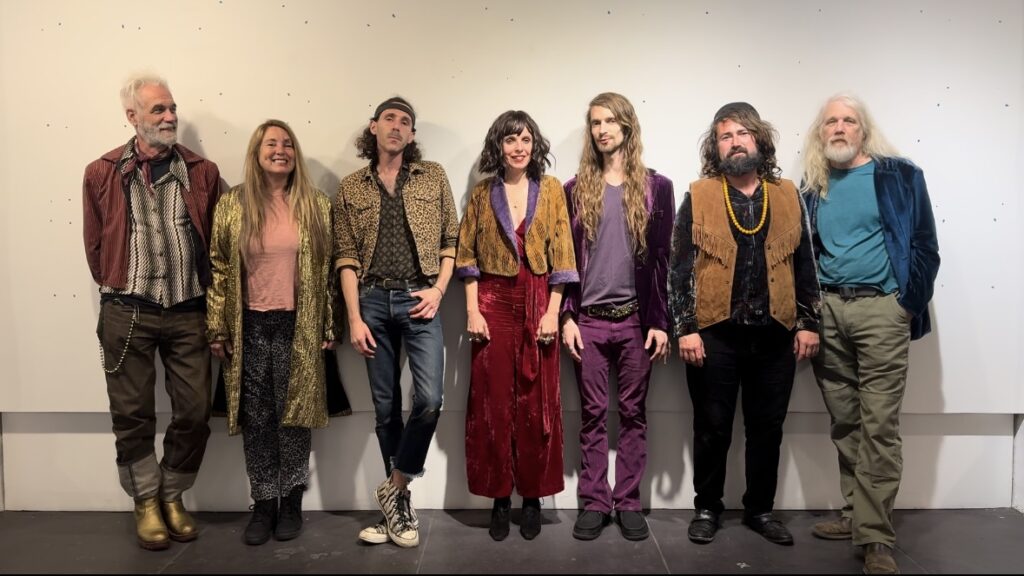
What’s next for you?
Nora: We have new Elf Freedom releases for this year that we are excited to share. Bee and Mirage are also releasing solo albums. Currently, we have been doing immersive live scores. I would love to find an immersive light/video artist to create an immersive psychedelic audio-visual experience for our live concerts. I would love if Elf Freedom magically played Red Rocks Amphitheater. That’s an ultimate goal for this coming year.
Mirage: I’m releasing an album called ‘Remnants of the Wet Egg,’ under my solo alias Mirage. It’s going to be a cassette release, like Solstice. I’ve been mixing select tracks from this past year’s Elf Freedom jams and would like to release another album in 2025. It feels like it’s going to be a step forward from Solstice. Our lineup has expanded, so the sound is a bit different. I really like the vibe of some of these pieces. I’m excited to see what happens when the culled material gets back into everyone’s hands. I recently got into playing with samplers and have been experimenting with sampling elements from our sessions and pushing the limits of what we can make from them.
Bee: This year, Elf Freedom is going to get as rich monetarily as we are artistically. And after that, we’re going to tour with Led Zeppelin.
Klemen Breznikar
Elf Freedom Facebook / Instagram / Bandcamp
Bee Appleseed | Interview | New EP, ‘My Evolution On Display Mixtape Vol. 3’

